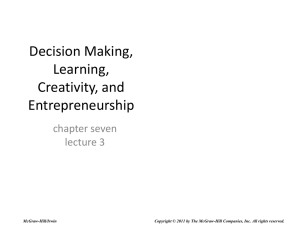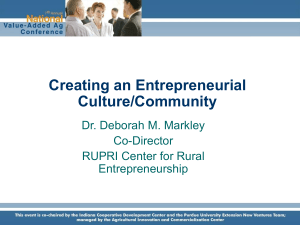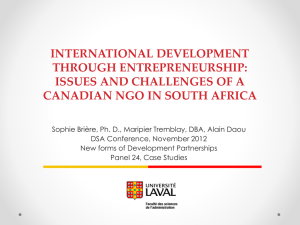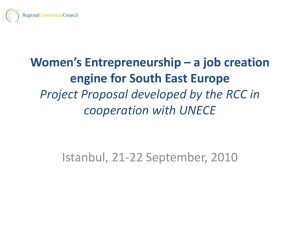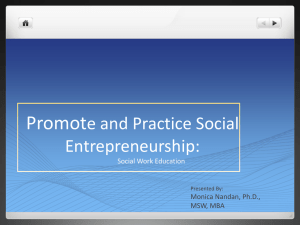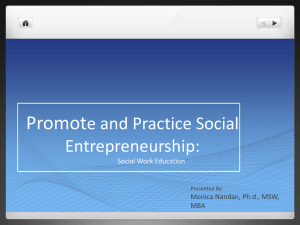Think Entrepreneurs … For the Unemployed
advertisement
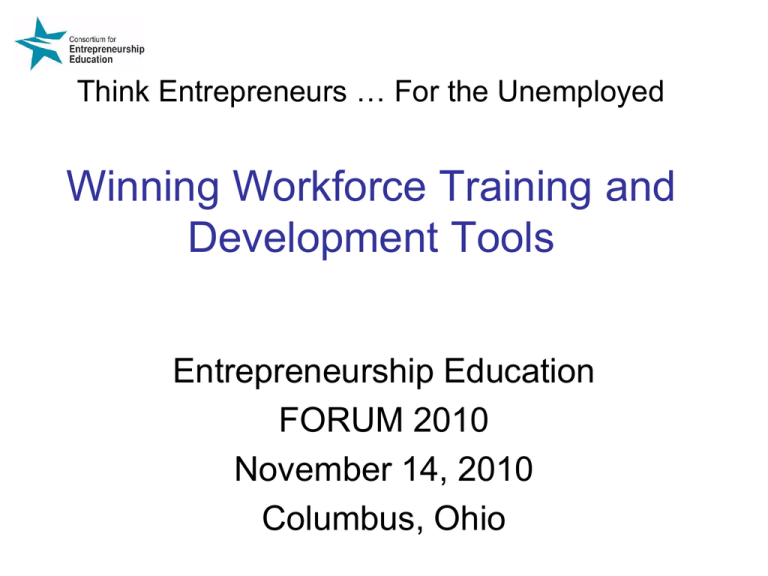
Think Entrepreneurs … For the Unemployed Winning Workforce Training and Development Tools Entrepreneurship Education FORUM 2010 November 14, 2010 Columbus, Ohio The Changing State of the Economy • A major study conducted by the Kauffman Foundation of the relationship between economic growth and entrepreneurship found that all nations with higher levels of entrepreneurial activity had above-average rates of economic growth. The Changing State of the U. S. Economy • Unemployment in the United States is at a 26year high (9.6 % in October 2010), as businesses seek to survive by cutting jobs • The majority of job losses have occurred in large companies, with the highest share among firms with 1000 or more employees • Individual entrepreneurs have been the fastest growing segment during the current recession The Changing State of the Economy • Small businesses are the foundation of the American economy. The Small Business Administration (SBA) currently reports that of the 27 million businesses in America, • 20 million have no employees, and • another 4 million have 5 employees or fewer. • 75% no employees - 89% 5 or fewer employees Revealing Statistics • Fewer than 40 percent of the nation’s largest and fastest‐growing job classifications require four‐year college degrees • Fewer than 30 percent of all jobs demand college degrees —a figure that has barely budged in the last two decades . Less than 20% of Baccalaureate Graduates in Spring 2010 found employment in the area for which they were preparing/majoring Mark Elgart, President and CEO AdvanceED, SACS/CASI More trend data… • Nearly 40% of today's postsecondary students are self supporting adults age 24 and up, almost half attend part-time, more than 1/3 work full‐time, 27% have children • 44% of Americans don’t believe they have the education they need for the jobs they want • 32 states do not have enough young adults in the pipeline to replace college‐educated, retiring Baby Boomers • There are 32 million adults who started, but did not complete, a college education • Every 23 seconds a student drops out of school in the US. David Pearce Snyder, Futurist states • “Training and education have always been preparation for the future …but, what will the future be like?” • He describes the future as a moving target - a work in progress that is widely expected to lead us through decades of on-going innovation and adaptation. • Graduates will need mastery of higherorder analytical, problem solving, and workreadiness competencies. Jim Clifton, CEO of Gallup stated in 2009 • “What the whole world now wants is a good job” • Earlier they reported they desired love, money food, shelter, safety, and/or peace as paramount • “Good Job” is evolving also because social contract between big companies and employees has changed - Sacrificing old certainties for new risks and opportunities in their own hands Consortium for Entrepreneurship Education www.entre-ed.org National Organization bringing Educational Agencies and Leaders Together To Build the Field of Entrepreneurship Education The Consortium for Entrepreneurship Education Mission: Accelerating Entrepreneurship Everywhere! • Website to provide resources for teachers www.entre-ed.org • Newsletter and e-Magazine – Future CEO Stars featuring benefits of programs offered by members www.fcsmag.com • National FORUM/Conference to provide professional development for teachers/program designers – November 12-15 in Columbus, Ohio • National Content Standards released June 2004 • National Standards of Practice released in June 2006 • Leading education partner of annual National Entrepreneurship Week February 19 – February 26, 2011 www.nationalEweek.com • Entrepreneurship Ambassador E-Group that encourages information sharing through educator networks National Content Standards • Entrepreneurial Process & Characteristics • Ready Skills • Foundation Skills • Communication Skills • Business Functions • Economics Standards consist of …. • 6 Categories of Content defined • 15 Standards established – To guide content development – To ensure comprehensive coverage – To provide what Entrepreneurs said was essential “to know and be able to do” in order to succeed as entrepreneurs • 403 Performance Indicators – To guide curriculum development – To guide knowledge and skills assessments Strengthen Program • • • • • • • • Plan your curriculum Validate your curriculum Increase credibility in community Ensure students are prepared for future Link with needs of economy Use high interest context Create problem-based learning activities Link with core academic teachers NEW from the Consortium Members … • A definition • Outcomes • Concepts • Methods • Accountability • Resources Standards Of Practice consist of …. • A consistent definition – To guide all program providers – To ensure consistent communication regarding program for entrepreneurial skills development • 5 areas of practice to be examined – To ensure comprehensive programming – To guide program development and delivery • An Assessment Instrument – To allow community review – To allow identification of areas of excellence and areas to focus improvement strategies Strengthen Program • • • • • • Plan your program activities Validate your curriculum Increase credibility in community Ensure students are prepared for future Link with needs of economy Use a variety of methods & high interest context • Create industry validated program components • Link with critical community partners www.nationalEweek.com February 19-26, 2011 Always celebrated the last week of National CTE Month Seeking Entrepreneurial Geniuses • 2010 National Entrepreneurship Week had a focus on Entrepreneurship Literacy "ENTREPRENEURIAL LITERACY EMPOWERS EVERYONE"! • Check the Website for details http://www.nationalEweek.org • Earn a "GENIUS" Certificate by responding to "20 Questions for All Americans" • Create activities using the "20 Questions for All Americans" at all levels of education. For Teachers Students - Parents - Entrepreneurs - Officials Creating Entrepreneurship Hall of Fame • Entrepreneurs contribute to our National economy and to the local communities in which they operate • 2011 National Entrepreneurship Week has a focus on honoring leading Entrepreneurs in local communities • See the website http://www.entre-week.org for details of how to enter a business person into the National Entrepreneurship Hall of Fame 2011 • Put your business leaders on the national map and establish your community as a place preparing entrepreneurs for advancing the economy and meeting community needs Lifelong Learning Model Helping Create a Pipeline of Entrepreneurs Everywhere The Future Entrepreneurs are in our Schools today The Aspiring Entrepreneurs are everywhere in our education system and in our workplaces The Start-up Entrepreneur needs specific skills, training, mentoring and guidance toward successful practices All Entrepreneurs need the opportunity to problem solve with other entrepreneurial minded business persons A successful USA Entrepreneurial Pipeline requires a LifeLong Entrepreneurial Learning Approach! Consortium for Entrepreneurship Education • CEE received a grant in 2008 to look at the Public Workforce System and determine how self-employment and entrepreneurship options could be enhanced as services to the unemployed • Focus on helping One-Stop Center staff see person’s “dreams rather than just a job!” Help develop the economy instead of just being a job matching service • CEE helped develop the Entrepreneurship Framework for High Growth segments of the economy – Now on the Internet Major Barriers to Creating Entrepreneurs Through WIA • Entrepreneurship is not well established in Federal and statewide policy and execution strategies • Staff lacks information and training about self-employment as a career option • Entrepreneurship does not fit into current WIA methods for measuring performance As you Review these Recommendations Remember …. • A job is work that needs to be done...that someone will pay you to do. For the self-employed, their employer may be the customer! • The authors believe that these recommendations, implemented with an entrepreneurial mindset, will lead to vigorous growth for individual entrepreneurs, enterprising communities, and the U.S. economy as a whole. As you Review these Recommendations Remember …. • This Call to Action seeks to merge successful economic development, education, and workforce development strategies, as we advance entrepreneurship as an essential answer to our current employment crisis. As you Review these Recommendations Remember …. • Maintaining the status quo is dangerous. As a nation, we must challenge ourselves through Congressional action so that our funding streams and community services for the unemployed can better address the needs of the future and not just those of the past DOL Entrepreneurship Competency Model http://www.careeronestop.org/CompetencyModel/pyramid.aspx?ENTRE=Y Consortium for Entrepreneurship Education • Framework Guide explanation document was developed to help people understand how the competencies can be used in education and training http://www.careeronestop.org/CompetencyModel/Info_Docu ments/CEEcomp-model.pdf • CEE developed listing of entrepreneurial careers in each career cluster to help educate about where entrepreneurs flourish in our economy http://www.entre-ed.org/_teach/clusters.pdf • Assisted with developing a Policymaker’s Action Guide titled Youth Entrepreneurship in America http://www.nationaleweek.org/eweek_files/YouthEntrepreneu rshipinAmericaYESG_report%5b4%5d.pdf Entrepreneurship Process Readiness Checklist Determine where prospective entrepreneurs are in the process: • Discovery – stage in which the entrepreneur generates ideas, recognizes opportunities, and determines the feasibility of ideas, markets, ventures, etc. • Concept Development – stage in which the entrepreneur plans the venture, identifies needed resources using a business plan, identifies strategies to protect intellectual property, etc. • Resourcing – stage in which the entrepreneur identifies and acquires the financial, human, and capital resources needed for the venture startup, etc. • Actualization – stage in which the entrepreneur operates the venture and utilizes resources to achieve its goals/objectives • Harvesting – stage in which the entrepreneur decides on the venture’s future (growth, development, demise) Entrepreneurship Process Readiness Checklist Competency Area and Performance Statements Know How or Can Do Need Help With Explain tools used by entrepreneurs for venture planning Assess start-up requirements Assess risks associated with venture Describe external resources useful to entrepreneurs during concept development Assess the need to use external resources for concept development Describe strategies to protect intellectual property Use components of a business plan to define venture idea Comments/Thoughts/Needs Entrepreneurship Technical Competency Checklist Competency Area and Competency Statements Have Need Comments Advocacy is Enhanced by Partnerships Youth Entrepreneurship Alliance YEA • YESG started with the Aspen Institute and NFTE leadership and worked for three years • Published a entrepreneurship policy guide for federal, state and local level policy makers • Members of the group wanted to broaden the scope of the advocacy • Now member groups organizing to advocate for Entrepreneurial Policies. (Many are members of the CEE. Focus of this work is policy advocacy and seeking champions) • Already encouraging STEM to become STEEM • See http://www.yealeaders.org for members and current efforts They do learn what we teach – Don’t They ? ENTREPRENEURSHIP EMPOWERS EVERYONE A Proposal for Entrepreneurial Skills Building by The Consortium for Entrepreneurship Education Columbus, OH Jobs, jobs, jobs! Just what is a job? "A JOB IS WORK THAT NEEDS TO BE DONE...that someone will pay you to do!“ More than 20 million Americans know that owning their own business does not mean that they are the "BOSS." In fact, the CUSTOMER is the boss because when the customers’ wants or needs aren’t satisfied a business will generally "fail". Just ask the manufacturers of buggy whips! Paper Released during National Entrepreneurship Week in February 2009 ENTREPRENEURSHIP EMPOWERS EVERYONE A Proposal for Entrepreneurial Skills Building for: Elementary Students Middle School Students High School Students College Students (2 year and 4 year) Adult Students Examples of effective programs at all levels "The entrepreneurs of tomorrow are in our schools today”! • We asked that each reader stand up for the freedoms provided in this nation that enable every citizen in the United States to use entrepreneurial skills in their everyday lives including, if they choose, starting their own businesses; to succeed or fail based on the decisions they make; and if they fail, to be able to try again as many times as it takes to succeed. Education needs to focus on Entrepreneurship • Because…. • The economy has changed drastically … Therefore what and how we teach must change • Problem-based Learning is critical to student development • A job is work that needs to be done...that someone will pay you to do. • For the self-employed, their employers will be the customers they find for themselves • Possessing the Entrepreneurial mindset and skills will allow for success in the future economy and workplaces ????????? Are there things about which we have talked that need clarification? What questions may I respond to ? What are your inputs/comments? Glad to serve as a resource for you! Horace.robertson@mindspring.com Horace C. Robertson 1120 Balmoral Drive Cary, NC 27511 919 – 467 - 9933 Secretary-Treasurer for The Consortium For Entrepreneurship Education www.entre-ed.org

